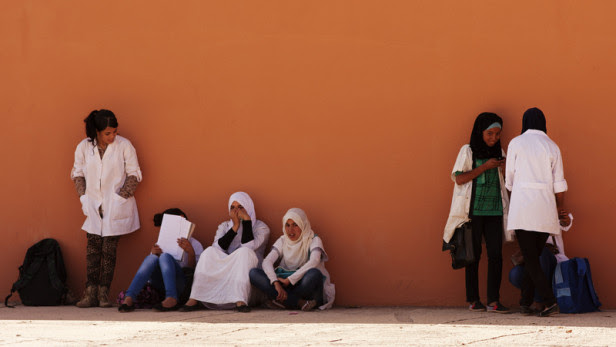Devex Impact
Woman Empowerment
By Sofia Hilali
Recent news from the Middle East and North Africa is rife with terror and devastation. From Aleppo to Tunis, we are all bystanders to unprecedented violence, wondering what — if anything — can be done to change the dynamic.
There are, of course, many causes that led to these unfortunate events but in my opinion only one likely long-term solution: to invest in women’s empowerment and education through corporate social responsibility.
Students in Morrocco. Investing in women’s empowerment and education through corporate social responsibility is one long-term solution to terror and devastation.
As a woman from Morocco, I’ve witnessed the struggle of women from the rural area in such a patriarchal society. With no education and no means to sustain themselves, women are far from being considered as equal partners neither by their husbands nor by society.
The government and donors have acknowledged the importance of education. In Morocco, an estimated 55 percent of the people living in rural areas are illiterate. To address, this the EU has already spent 27 million euros ($29.7 million), from 2008 to 2013, on an extensive literacy program, but progress remains slow.
The issue still receives too little funding, too little support from across our society. Moreover, while we lament the rise of extremism, we know that almost without exception the extremists share one trait — an attitude that disempowers women. Yet a society that sees an increasing number of empowered, educated women is in my mind, one of the best antidotes to the likes of the Islamic State group or Boko Haram that would enslave girls.
It’s time for the private sector to play more of a leading role. The good news is, that greater involvement is not just in their interest — it’s essential to their success.
Growing interest
But what, you may ask, does this have to do with the private sector in Morocco? And what kind of role could the private sector play?
Well to start, we know that more educated people earn more and are more active consumers. More money in the pocket of my Moroccan sisters is good for sales generally. Moreover, across Morocco (especially in the more economically challenged rural areas where women are more marginalized) they are paradoxically the ones who make most of a typical family’s spending decisions — which brands of soap, which kinds of food or style of clothing.
The fact is that women can help the private sector grow across the region, and empowered women can help it grow faster. And this, the growing regional economy, will also combat extremism.
Now it’s true, corporate social investment is not common in nations like Morocco. Still, in a way, companies are already involved in development. Many corporations participate in the society by giving charitable donations. Some support schools or orphanages. Some even help with job training. But it is in their interest to do much more. And even with the efforts that do exist across the region, relatively little of this effort is focused specifically on women and girls. This should change.
Partnerships and collaboration
But how do we make real changes to yield tangible outcomes? Simply put, we should be taking investment in women’s CSR to the next level, by building relationships with the government and partnering with national initiatives for development such as the National Human Development Initiative in Morocco. But to get there, we must first incentivize investment into women’s issues.
The initial step would be the public promotion of this idea through a combination of private and public sources. By making the argument to the public that focusing on women’s CSR is indeed a good thing, we will be able to create a political space for these matters and a national engagement that otherwise wouldn’t exist.
Secondly, by setting measurable goals for these initiatives, such as an increased literacy rate among Moroccan women or more women in technical jobs, etc., we are able to define success and reward the best efforts.
Finally, the core of this process will be the policy environment surrounding it, built from the public promotion of the idea and executed by the government. What better motivation for companies to join the initiative than for them to receive tax breaks or matching investments if they meet certain criteria. Likewise, by putting in place a challenge fund where the government agrees to match corporate investments in certain areas focused on specific women’s issues.
In addition, private firms can do their part by collaborating with local NGOs that target women and gender equality, investing in organizations that work to improve women’s productive capacity and access to markets that integrate training in professions and increase access to technical skills and new technology. Moroccan companies have come a long way in the CSR world, but their actions have never fit a clearly defined strategy for advancement. Partnering with NGOs that have definitive objectives is the most effective plan to build a consistent CSR strategy that is sustainable for the future. They should do this because it is right, and they should do it because it is smart.
Without question, it will take time for corporate social responsibility to be understood as more than just a communication strategy and to be fully embraced by the private sector in countries like mine. But as they say, the time is now. The private sector stands to gain from growth in Morocco. It stands to gain more as more women have more money to spend, and more visibility in our society. It is more likely to continue that growth (and safeguard its investments) in a stable region where women’s rights are a national priority. And smart firms that support women in their CSR will also likely win the respect — and brand loyalty — of the women these projects support.
Will corporate social responsibility help defeat terrorism? By itself, of course not. And it may take generations to repair the damage done by misogynous regimes like the Islamic State group. But now, before the next Palmyra, private sector leaders across our region have the chance to act. They need to realize that in focusing on women they are growing their future, reducing their risks, and in a very real way allying with their own most important supporters.
Join the Devex community and access more in-depth analysis, breaking news and business advice — and a host of other services — on international development, humanitarian aid and global health.
Photo by: David Rosen / CC BY








